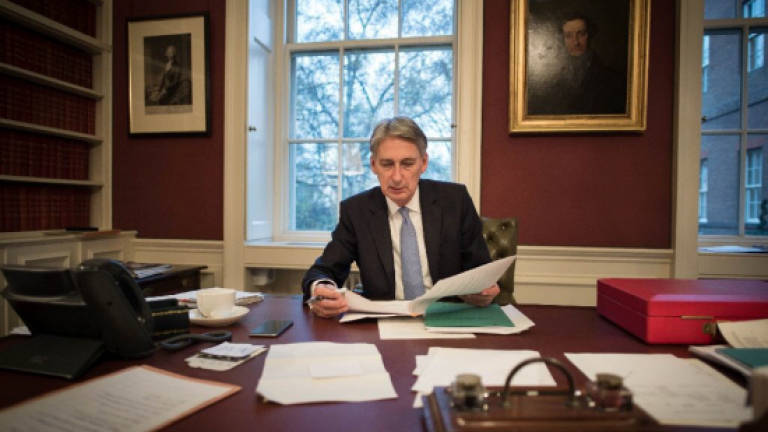Britain set for budget under Brexit stormclouds

LONDON: Britain on Wednesday prepared for its first budget since the Brexit referendum five months ago, with government hopes of trimming austerity crimped by lower growth expectations as divorce from the EU looms.
The Conservative government's finance minister Philip Hammond delivers the regular Autumn Statement before parliament around 8.30pm (Malaysian time).
"Philip Hammond will use his first Autumn Statement to unveil a series of measures designed to improve the living standards of ordinary working class people and their families," the Treasury said in a statement.
Among his key tax-and-spend pledges, Chancellor of the Exchequer Hammond will announce a £1.4-billion investment to help build 40,000 "affordable" homes.
Plans to ban certain costs incurred by renters of residential properties has already had an impact, with share prices of estate agents slumping in early trade Wednesday.
The Chancellor was expected also to announce a rise in the minimum wage to £7.50 an hour (RM41) in April from £7.20.
And he was likely to confirm a plan to cut corporation tax to 17 percent by 2020 from the current 20 percent.
"We need to be match-fit for the opportunities and challenges" arising from Brexit, Hammond declared on Sunday.
But he warned Britain still faced an "eye-watering" deficit following the 2008 global financial crisis that has triggered almost a decade of deep government spending cuts.
Official data Tuesday revealed smaller-than-expected government borrowing at £4.8 billion in October from a year earlier on robust tax revenues.
Even so, Hammond was Wednesday expected to hike his borrowing forecasts, eyeing weaker-than-anticipated economic growth ahead of Britain's split from the EU.
Research group Capital Economics predicted the Autumn Statement would outline "a modest" stimulus package of about £7 billion in the 12 months to the end of March 2018.
"This will help offset some of the negative effects of Brexit-related uncertainty on the economy," it said.
"However, the big picture is that austerity is not over – just that fiscal policy should be less of a drag on the economy than previously planned."
The British economy has remained resilient since the referendum but some experts say a heavy blow will fall once divorce proceedings with the rest of Europe get underway.
Tackling inequality
Prime Minister Theresa May has vowed to trigger Britain's exit from the European Union by the end of March, after disaffected British voters sent shockwaves across the world in the June 23 referendum by choosing to leave the bloc.
Some economists argue that Donald Trump's shock election as US president could similarly persuade May's administration to do more to help workers who have felt shunned by government policies.
"June's Brexit vote and Donald Trump's win in the US presidential election has highlighted the need for governments to tackle income inequality," said IHS Markit economist Howard Archer.
Over the weekend, May announced fresh investment in research and development, revealing that Hammond would hike its spending by £2 billion annually until 2020.
Investments will be rolled out through a new fund that will prioritise technologies including robotics, industrial biotechnology and medical technology.
The government is also set to announce new infrastructure spending, particularly on roads. — AFP